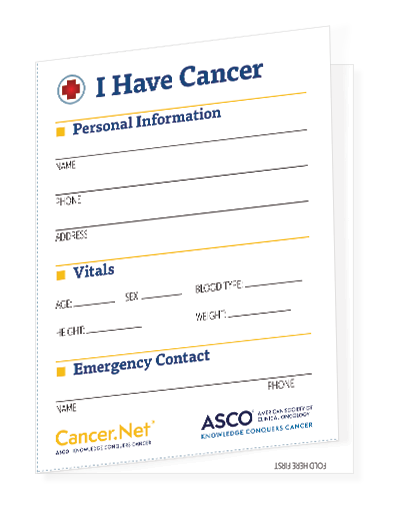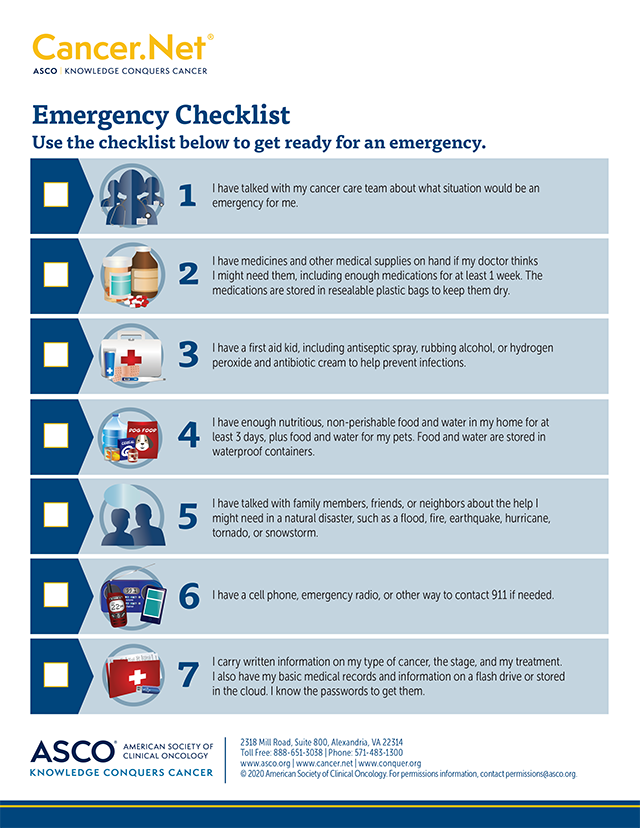Keep all your important information close by in the event of an emergency. Bring this information with you if you need to leave your home. Download our free, printable Emergency Checklist and our Emergency Information Wallet Card.
An emergency can make it difficult for you or your loved one to get the cancer treatment or care you need. Natural disasters, like floods, fires, earthquakes, or hurricanes, and other emergencies like conflict are challenging for everyone. But if you have cancer, it puts you at a greater risk. Even when you plan ahead, you may not have everything you need if you have to leave home in the event of an emergency.
This article will help you prepare for an emergency or natural disaster when you or a loved one has cancer. It will also provide resources for you if you have to leave your home suddenly.
Planning ahead for an emergency
The most important thing you can do to plan and prepare for an emergency is talk to your health care team. Consider finding out the following information:
-
Are there any medications I need to keep on hand?
-
What should I do if I have to miss cancer treatment because of an emergency?
-
Where can I go for emergency care?
Use the Emergency Checklist to help you make your plan ahead of time.
When you are making your emergency plan, talk to your family, friends, and neighbors. Exchange phone numbers and contact information with your neighbors. If you do not live near your loved one with cancer, see if there is a neighbor who can check on them during an emergency if you cannot. The U.S. Department of Homeland Security (DHS) provides information on making a family emergency plan, in English and Spanish.
Keep important COVID-19 precautions in mind when you are making your emergency plan. Be sure to include face coverings, like surgical masks, N95 masks, or KN95 masks, in your emergency kit (see below).The safest way to protect yourself against COVID-19 is to get the COVID-19 vaccine and the recommended boosters. Learn more about what people with cancer need to know about COVID-19 and about COVID-19 vaccines.
Create an emergency kit
Having emergency supplies is especially important for people with cancer. You need nutritious food, enough water, and a way to contact emergency services.
Cancer and its treatment can make you more likely to get infections, especially if you do not have access to clean water. A first-aid kit with hand sanitizer, disinfectant, and antibiotic cream is important.
When you are putting together your emergency kit, consider including the following:
-
Flashlights
-
Emergency radio
-
Face masks, preferably surgical masks, N95, or KN95 masks
-
Manual can opener
-
Maps
-
Cell phone chargers and backup batteries
-
Contact information for neighbors, family members, and your health care team
-
Your medical information
-
Needed medical supplies
-
Your official identification, such as a drivers license or passport
Always pack your emergency supplies in a waterproof container, such as a sealed plastic bag or pouch. Do not use any supplies that have touched floodwater.
Medical information to keep on hand during an emergency
If possible, bring your complete medical record with you during an emergency. It may not be possible to access this information during a natural disaster or other emergency. Learn more about building a personal medical record.
You should also keep some basic information on hand at all times. You can store it in your pocket, purse, or suitcase. Be sure to include:
-
Your doctor's name and phone number
-
Information on your type and stage of cancer
-
The type of cancer treatment you are having
Download Cancer.Net's free, printable wallet card to keep track of this important information. This wallet card prints on regular printer paper and can be folded along the dotted lines to fit in your wallet or purse.
How much food and water to have on hand during an emergency
You need food and clean water to last at least 3 days at your home. But it is better to keep 1 to 2 weeks worth of food and water on hand if possible. Have a way to boil or purify water, such as water purification tablets or a pot, camping stove, and fuel. Put a can opener in your kit to open cans of food. Also, if you have pets, store food, water, and medication for them too.
You can buy food and supply kits from emergency organizations or make your own. Be sure to use waterproof containers. You can pack some of your food and water in a "go bag" to take if you leave your home.
Leaving home and taking shelter during an emergency
You can stay home during some emergencies, but may lose access to water, electricity, heat, or air conditioning. If you do not evacuate before an emergency, make sure you are prepared to leave home if you have to. Pack a bag that includes your emergency kit (see above), shoes, and clothing you might need. Consider the clothing you might need, like waterproof boots or shoes, blankets, and coats.
If you lose electricity, you may not be able to charge your phone for some time. Keep your phone plugged in while you have power and charge any extra battery packs that you have. If possible, keep your car fueled or charged so you can get to safety if needed.
Make sure you know where to get reliable information during an emergency, especially about when and where to evacuate. News and false information can spread quickly during an emergency and it may be difficult to tell them apart. Check your local news on TV, the radio, or online to get accurate weather reports, evacuation information, and information about the emergency as it unfolds. You can also check social media pages for the local authorities. If you do not recognize the source of information, try to confirm it using a known news or local government source before acting upon it.
How to find emergency cancer care
If possible, call your doctor's office as soon as possible to learn what to do next to continue your cancer treatment and care. The American Society of Clinical Oncology (ASCO) has a Resources for Disaster Assistance page with resources for help in an emergency. The National Cancer Institute (NCI) also has a website with emergency resources for people with cancer in English and Spanish.
If you have Medicare, their website can tell you where to get medication or dialysis in areas affected by natural disasters in the United States in English and Spanish.
Emergency checklist
You can use the checklist below to get ready for an emergency. Download and print Cancer.Net's Emergency Checklist for a reminder for what to do to prepare for an emergency.
-
I have talked with my cancer care team about what situation would be an emergency for me.
-
I carry written information on my type of cancer, the stage, and my treatment.
-
I have medicines and other medical supplies on hand if my doctor thinks I might need them, including enough medications for at least 1 week. These are stored in a waterproof bag or container.
-
I have a first aid kit, including antiseptic spray, rubbing alcohol, or hydrogen peroxide and antibiotic cream to help prevent infections.
-
I have enough nutritious food and water in my home for at least 3 days, plus food and water for my pets. Food and water are stored in waterproof containers.
-
I have talked with my family members, friends, or neighbors about the help I might need in a natural disaster, such as food, fire, earthquake, hurricane, tornado, or snowstorm.
-
I have a cell phone, emergency radio, or other way to contact 911 if needed.
-
I have my basic medical records and information on a flash drive or stored in the cloud. I know the passwords to get them.
These resources are also available in Ukrainian (Українська), Hungarian (Magyar nyelv), Polish (Język polski), Romanian (Română), and Russian (Русский).
Related Resources
When to Call the Doctor During Cancer Treatment
Top Food Safety Tips for Severe Weather
After a Hurricane: 6 Things People with Cancer Should Know
Coronavirus and COVID-19: What People with Cancer Need to Know
How to Prepare When You Have to Travel for Cancer Treatment
More Information
Federal Emergency Management Agency (FEMA): Family Emergency Plan
National Cancer Institute: Help for Cancer Patients and Researchers Affected by Catastrophic Events


